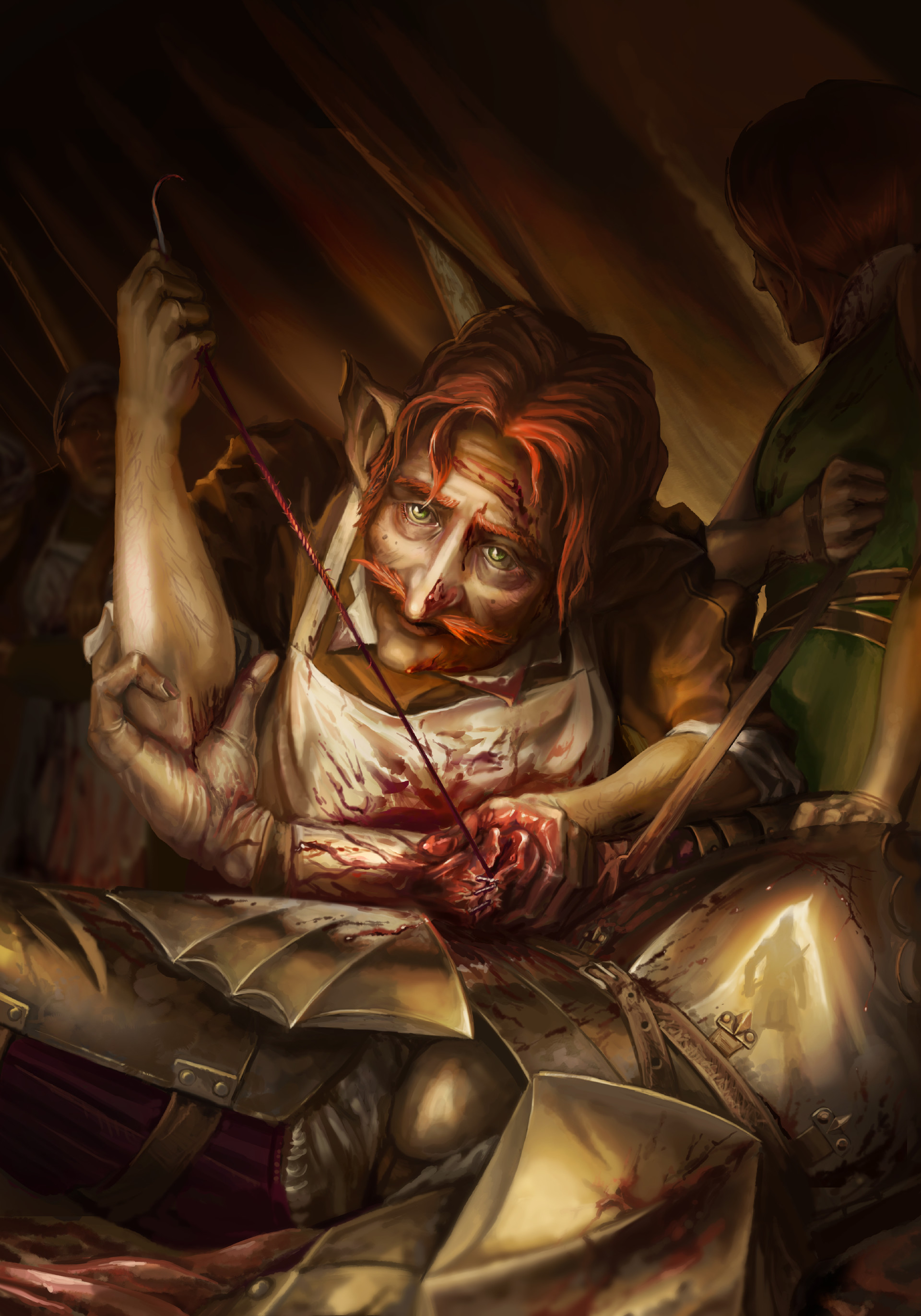
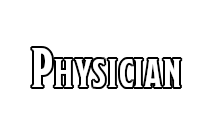



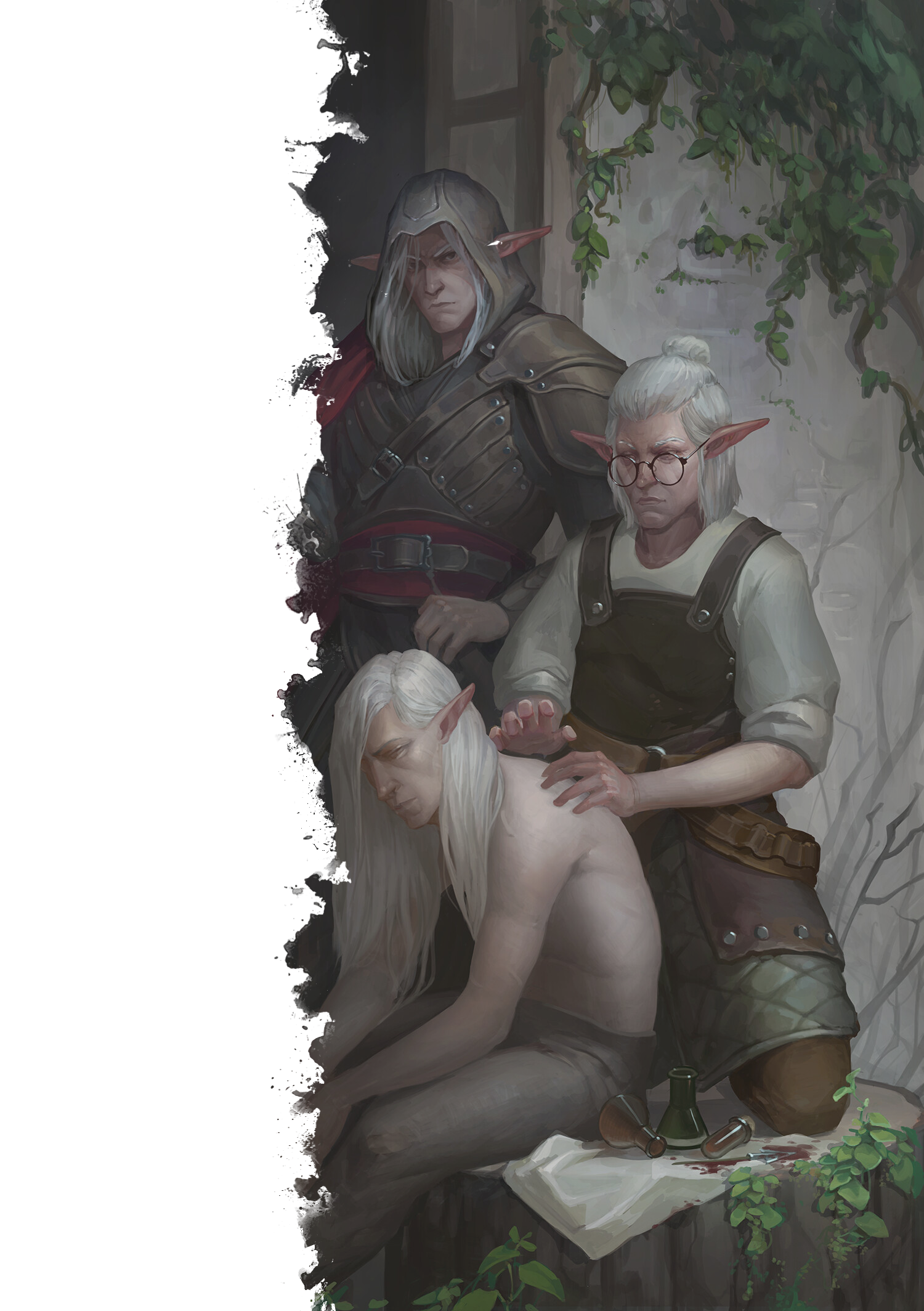
Physician
Keeping silent while he works, a gnome finishes stitching up a wound a soldier has suffered on the battlefield. He gets up off the edge of the bed and looks out to the rest of tent to see many others in need of attention.
An anonymous man takes down notes in a book as he looks over a fellow in a cot in front of him. Wearing gloves and keeping his face covered in a long bird-like mask, he jots down the current symptoms and any progress the infirmed man has made in recovering from his illness.
A young half-elven girl watches on, tears in her eyes as a panther is released into the wild after weeks of medical attention and care given to the animal.
All of these are physicians, experts in their different fields of medicine, and taken upon themselves an oath to cure those in need, without bias or prejudice.
Medical Practitioners
While a spellcaster might spend years praying or studying the secrets of the weave to cast magic, a physician studies the field of medicine, exploiting a creature's natural healing and applying their theories and methods to aid the ill and infirmed.
A physician's duty is to heal their allies, and use their calculating mind to opportunely strike at enemies where they are weakest. They are also competent researchers and investigators in their specialized medical field, whether it be determining how an injury or illness suffered by a creature came to be, identifying and interacting with different forms of flora and fauna, or recognizing and extrapolating upon a creature's motives and reasoning.
Creating a Physician
When creating a physician, think about why you are with the party. Does the party represent a significant investment for a certain benefactor and you are charged with keeping them alive? Are you there to perform your newly developed and untested medical treatments on the unsuspecting party and record the results?
When and where did you study medicine and what lead up to you being with the party? Are you a prodigy sick of research and would rather take to the field? Or were you expelled from medical school and have resorted to testing your proven dangerous procedures on the party members?
The Physician
| Level | Proficiency Bonus | Calculated Strike | Practice Points | Practices Known | Features |
|---|---|---|---|---|---|
| 1st | +2 | 1d6 | - | - | Calculated Strike, Medical Training |
| 2nd | +2 | 1d6 | 2 | 2 | General Practices, First Aid (d6) |
| 3rd | +2 | 1d6 | 3 | 2 | Expertise, Medical Specialist |
| 4th | +2 | 1d6 | 4 | 2 | Ability Score Improvement, Identify Poison and Disease |
| 5th | +3 | 2d8 | 5 | 3 | Fast Movement, Remove Contaminant |
| 6th | +3 | 2d8 | 6 | 3 | Deliverance, Medical Specialist Feature |
| 7th | +3 | 2d8 | 7 | 4 | Clinical Diagnosis, Resuscitation |
| 8th | +3 | 2d8 | 8 | 4 | Ability Score Improvement |
| 9th | +4 | 2d8 | 9 | 5 | First Aid (d8) |
| 10th | +4 | 2d8 | 10 | 5 | Expertise |
| 11th | +4 | 3d10 | 11 | 5 | Medical Specialist Feature |
| 12th | +4 | 3d10 | 12 | 6 | Ability Score Improvement |
| 13th | +5 | 3d10 | 13 | 6 | First Aid (d10) |
| 14th | +5 | 3d10 | 14 | 6 | Defensive Evaluation |
| 15th | +5 | 3d10 | 15 | 7 | Medical Specialist Feature |
| 16th | +5 | 3d10 | 16 | 7 | Ability Score Improvement |
| 17th | +6 | 4d10 | 17 | 7 | First Aid (d12) |
| 18th | +6 | 4d10 | 18 | 8 | Inexorable |
| 19th | +6 | 4d10 | 19 | 8 | Ability Score Improvement |
| 20th | +6 | 4d10 | 20 | 8 | Master of Medicine |
Quick Build
You can make a physician quickly by following these suggestions. First, make Intelligence you highest ability score, followed by Constitution or Dexterity. Second, choose the sage background.
Class Features
As a physician, you gain the following class features.
Hit Points
- Hit Dice: 1d8 per physician level
- Hit Points at 1st Level: 8 + your Constitution modifier
- Hit Points at Higher Levels: 1d8 (or 5) + your Constitution modifier per physician level after 1st
Proficiencies
- Armor: Light armour
- Weapons: Simple weapons, blowguns, hand crossbows, nets, shortswords
- Tools: Herbalism kit
- Saving Throws: Dexterity, Intelligence
- Skills: Choose three from History, Insight, Investigation, Medicine, Nature, Perception, and Persuasion
Equipment
You start with the following equipment, in addition to the equipment granted by your background:
- (a) a light crossbow and 20 bolts or (b) any simple weapon
- a doctor's pack, studded leather armour, and two daggers
Calculated Strike
Beginning at 1st level, you are able to study a target and strike carefully, exploiting any weaknesses in their physiology. As a bonus action on your turn, you can study a target you can see within 60 feet of you. For the next minute, or until you study another target, attack rolls and damage rolls made with a finesse or ranged weapon against the target may use your Intelligence modifier instead of Strength or Dexterity.
In addition, once on each of your turns, you can deal an extra 1d6 damage to the target you have studied if you hit it with an attack. The attack must use a finesse or ranged weapon.
The amount of extra damage increases as you gain levels in the class, as shown in the Calculated Strike column of the Physician table.
Medical Training
At 1st level, you gain proficiency in the Medicine skill. If you are already proficient in it, your proficiency bonus is doubled for any ability check that uses Medicine.
Additionally, you can use your Intelligence modifier instead of your Wisdom modifier when you make a Medicine skill check.
First Aid
Beginning at 2nd level, you can use your medical training to expertly tend to the wounded during a short rest. If you or any friendly creatures who allow you to aid them regain hit points at the end of a short rest, each of those creatures regain an extra 1d6 hit points.
The extra hit points increase when you reach certain levels in this class: to 1d8 at 9th level, to 1d10 at 13th level, and 1d12 at 17th level.
General Practices
Starting at 2nd level, your study allows you to perform a range of medical treatments and techniques that affect yourself and those around you. Your professional health is represented by a number of practice points. Your physician level determines the number of points you have, as shown in the Practice Points column of the Physician table.
You can spend these points to fuel various practice features. You start knowing Alleviate Injury and two general practice features of your choice, which are detailed under "General Practices", at the end of the class description.
When you gain certain physician levels, you learn additional practices of your choice, as shown in the Practices Known column of the Physician table. Additionally, when you gain a level in this class, you can choose one of the practices you know replace it with another practice that you could learn at that level.
When you spend a practice point, it is unavailable until you finish a short or long rest, at the end of which you regain all of your expended practice points. You must spend at least 30 minutes of the rest revising over your medical notes to regain your practice points. Some of your practice features require your target to make a saving throw to resist the feature’s effects. The saving throw DC is calculated as follows:
Practice save DC = 8 + your proficiency
bonus + your Intelligence modifier
Alleviate Injury
While a healer's kit is on your person, as an action you can spend 1 practice point to restore 1d8 + your Intelligence modifier hit points to a creature you touch, plus an extra 1d8 hit points for each additional practice point you spend.
Expertise
At 3rd level, choose two of your skill proficiencies. Your proficiency bonus is doubled for any ability check you make using either of the chosen proficiencies. At 10th level, you can choose another two skill proficiencies to gain this benefit.
Medical Specialist
At 3rd level, you choose to specialize your medical profession. Choose Field Surgeon, Veterinarian, Psychiatrist, or Plague Doctor, all detailed at the end of the class description. The specialty you choose grants you features at 3rd level and again at 6th, 11th, and 15th level.
Ability Score Improvement
When you reach 4th level, and again at 8th, 12th, 16th, and 19th level, you can increase one ability score of your choice by 2, or you can increase two ability scores of your choice by 1. As normal, you can’t increase an ability score above 20 using this feature.
Identify Poison and Disease
At 4th level, as an action, you can spend 1 practice point and immediately identify any poison, poisonous creature, or disease you can see within 30 feet of you.
Fast Movement
Starting at 5th level, your speed increases by 10 feet while you aren't wearing heavy armour.
Remove Contaminant
From 5th level onwards While a herbalism kit is on your person, as an action, you can spend 2 practice points to flush the contaminants from a creature you can touch. You can cure one disease or neutralize one poison affecting the creature.
Deliverance
At 6th level, whenever you restore hit points to another creature, your movement doesn't provoke opportunity attacks for the rest of the turn.
Clinical Diagnosis
Starting at 7th level, if you spend at leat 1 minute observing or interacting with another creature outside combat, you can learn certain information about its apparent health. The DM tells you two of the following characteristics about the creature:
- Constitution score
- Maximum hit points
- Current hit points
- Whether or not the creature is suffering from any diseases
- Whether or not the creature is suffering from any effects reducing its hit point maximum
- Whether or not the creature is suffering from any conditions
Resuscitation
At 7th level, as an action, you can spend 3 practice points and 300 gp worth of medical supplies to perform a medical maneuver on a creature you can touch that has died in the last minute. That creature returns to life with 1 hit point. This feature can’t return to life a creature that has died of old age, nor can it restore any missing body parts.
Defensive Evaluation
At 14th level, you can add your Intelligence modifier to any saving throw you make that doesn't include your proficiency bonus against effects that you can see. To gain this benefit, you can't be blinded, deafened, or incapacitated.
Inexorable
Beginning at 18th level, when you roll for initiative and have 17 or less practice points left, you regain 1 practice point.
Master of Medicine
At 20th level, you gain the following features:
- When you would normally roll one or more dice to restore hit points, you instead use the highest number possible for each die. For example, instead of restoring 2d8 hit points to a creature, you restore 16.
- You suffer none of the frailty of old age, and can't be aged magically. You can still die of old age, however. For every 2 years that pass, you body only ages 1 year.
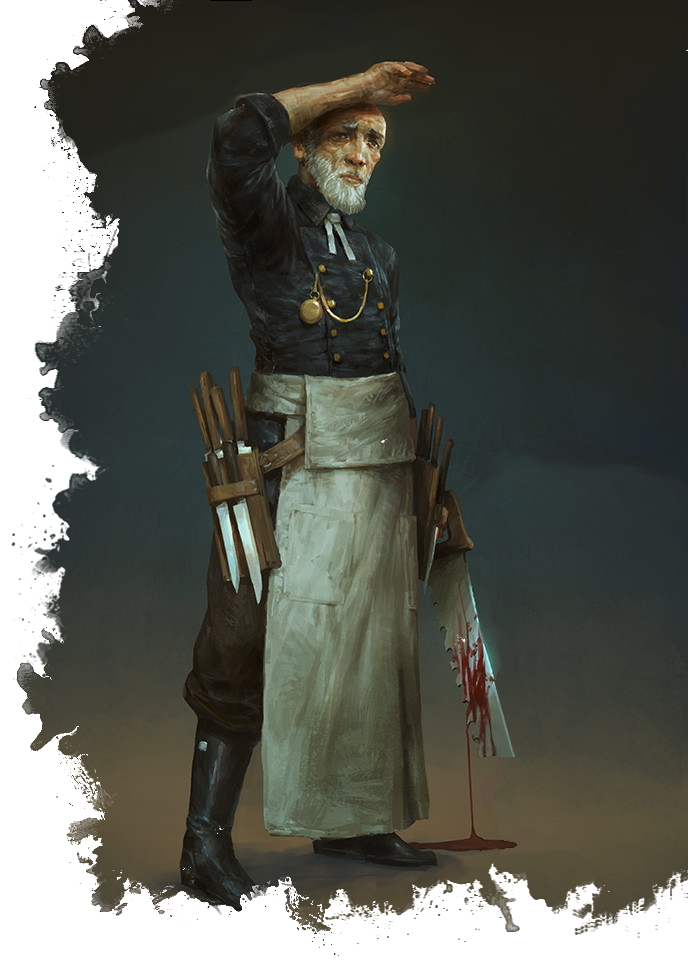
Medical Specialist
Different physicians focus in different areas of medicine. The specialist you choose to emulate reflects your focus.
Field Surgeon
The field surgeon chooses to focus on the physical aspects of medicine, mending broken bones, reattaching tissues, or expertly carving through flesh using their tools of the trade.
Bonus Proficiencies
At 3rd level, you gain proficiency in medium armour. In addition, when you hit with a melee attack using a finesse weapon, you gain a +1 bonus to the damage roll. You also gain a +2 bonus to AC while holding a healer's kit and you aren't incapacitated.
Deep Incision
At 3rd level, when you hit a creature with a melee weapon attack, you can use a bonus action and spend 1 practice point to deal an extra 3d4 damage.
Compression Bandages
Starting at 6th level, whenever you spend practice points to restore hit points to a creature, they also gain temporary hit points equal to 2 + the number of practice points spent.
Disabling Strike
From 11th level onwards, the damage dealt by your Deep Incision feature increases to 3d6, and whenever you deal damage to a creature with it, you can impose one of the following effects on that target:
- It must succeed on a Constitution saving throw or be blinded until the start of its next turn.
- It must succeed on a Dexterity saving throw or have its speed reduced by 15 until the end of its next turn.
- It can't take reactions until the end of your next turn.
Forensics
Starting at 15th level, you are so familiar with the structure and functions of a creature's anatomy that you know what harm has befallen it in the past. You spend at least 1 minute inspecting a creature or corpse, then draw conclusions on what it has suffered in recent events. You can inspect this way a number of minutes equal to your Intelligence score and must maintain concentration during that time, as if you were casting a spell.
Once you use this feature, you can't use it again until you finish a short or long rest.
Creature Inspection. Staying within 5 feet of the creature as you inspect it, you can correctly theorise the situations of which it has been injured. After inspecting it for 1 minute, you learn what harmed the creature, as well as the most significant event involving the creature and its injury. If the creature was harmed another way in the recent past (within a number of days equal to your Intelligence score), you can spend 1 additional minute to learn the same information about that injury.
Corpse Inspection. As you inspect a corpse, you formulate conclusions of its demise, going back a number of years equal to 5 times your Intelligence score. For each minute you inspect the corpse, you learn about one injury its sustained, beginning with the most recent.
Veterinarian
You studied on how to care for animals, as well as people, helping those in need with your faithful companion.
Veterinarian Education
At 3rd level, you gain proficiency in the Animal Handling and Nature skills.
Additionally, you can use Intelligence modifier instead of your Wisdom modifier when you make an Animal Handling skill check.
Animal Caretaker
At 3rd level, when you choose this feature, you create a powerful bond with a creature of the natural world.
With 8 hours of care and the expenditure of 10 gp worth of rare herbs and fine food, you bond with a beast to serve as your faithful companion. Your physician level determines the beasts you can bond with, as shown in the Beast Companions table. At 3rd level, for example, you can acquire the aid of any beast that has a challenge rating of 1/4 or lower that is Large or smaller and doesn't have a flying or swimming speed.
BEAST COMPANIONS
| Level | Max CR | Max Size | Limitations | Example |
|---|---|---|---|---|
| 3 | 1/4 | Large | No flying or swimming speed | Elk |
| 6 | 1/4 | Large | No flying speed | Giant Lizard |
| 11 | 1/4 | Large | - | Giant Owl |
At the end of the 8 hours, the bonding ritual is complete. You can have only one beast companion at a time.

If your beast companion is slain, released, or lost, you can bond with another, following the same restrictions.
Companion's Bond
Also at 3rd level, your beast companion gains a variety of benefits while it is linked to you.
The beast companion loses its Multiattack action, if it has one.
Your beast companion is friendly to you and your companions, and it obeys your commands. In combat, the beast companion shares your initiative count, but it takes its turn immediately after yours. It can move and use its reaction on its own, but the only action it takes on its turn is the Dodge action, unless you take a bonus action on your turn to command it to take another action. That action can be one in its stat block or some other action. If you are incapacitated, the beast can take any action of its choice, not just Dodge.
The beast companion has abilities and game statistics determined in part by your level. The beast companion uses your proficiency bonus rather than its own, and it uses your Intelligence modifier, instead of its Strength or Dexterity, for attack rolls with weapons it is proficient with. In addition to where it normally uses its proficiency bonus, it also adds it to its AC.
The beast companion is proficient in two skills of your choice. It also becomes proficient with all saving throws.
For each physician level after 3rd, the beast companion gains an additional hit die and increases its hit points accordingly.
Your DM has the creature's statistics.
Savage Strikes
Starting at 6th level, your beast companion's attacks count as magical for the purpose of overcoming resistance and immunity to nonmagical attacks and damage.
Little Helper
Beginning at 11th level, your beast companion can use the Help action as a bonus action on its turn.
Unwavering Loyalty
From 15th level onwards, your beast companion is immune to being charmed or frightened.
Psychiatrist
As a phychiatrist you have studied the trappings of the mind, and are a comforting presence to others around you. You know just the right thing to say to help others through turmoil, or tip them over the edge.
Psychiatric Education
At 3rd level, you gain proficiency in the Insight and Persuasion skills.
Additionally, you can use your Intelligence modifier instead of your Wisdom modifier when you make an Insight or Persuasion skill check.
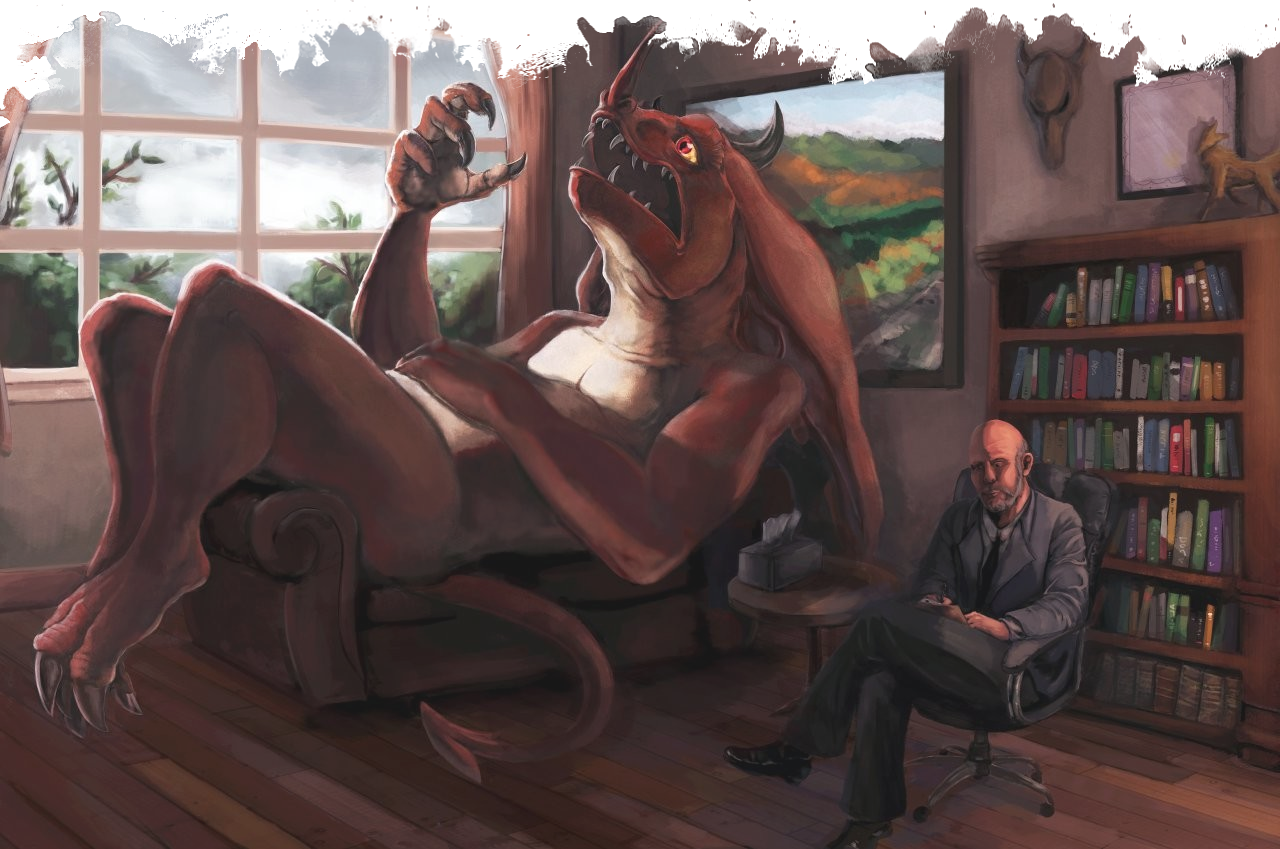
Moving Words
At 3rd level, your words can inspire fear or friendship. As a bonus action, you can spend 1 practice point to have one creature within 60 feet of you that can hear you make a Wisdom saving throw against your Practice Save DC. On a failed save, you can choose one of the following options:
Fear. The creature is frightened of you until the end of your next turn.
Friendship. If the creature is not hostile to you, it is charmed by you for 10 minutes, or until you or your allies do anything harmful to it. When this feature ends, the creature doesn't know it was charmed by you.
Reassurance
At 6th level, when you or a creature within 30 feet of you would be forced to make an Intelligence or Wisdom saving throw, you can use your reaction to grant them advantage on the saving throw.
Cognitive Psychology
At 11th level, whenever you would use your Clinical Diagnosis feature to observe a creature, you can choose to learn one additional characteristic from the following options:
- Wisdom score
- Intelligence score
- Charisma score
- The creature's alignment
Counselling
At 15th level, you can spend an extended time with a creature to change its morals. You can spend six months in downtime to change a creature's alignment by one step.
At the end of the 6 months, you must succeed on a Persuasion check with a DC of 8 + the creature's maximum number of hit dice to change the creature's alignment. For example, after a successful check you can change a chaotic neutral creature to the true neutral alignment. The target of this feature must have an Intelligence 6 or more and you both must share a language. At the end of the 6 months, if the check is successful, the creature also gains the benefits of the greater restoration spell (you can choose the debilitating effect to end, cannot choose petrification). This feature has no effect on a creature immune to being charmed.
Plague Doctor
Those who specialize in becoming a Plague Doctor study the multitude of diseases and ailments that befall society. A plague doctor can either use the knowledge to cure those in need or harness it to inflict suffering on others.
Plague Grenade
At 3rd level, you are able to prepare and throw noxious globes containing various contagions. While a herbalism kit is on your person, as a bonus action, you can fashion and throw one of these globes.
It counts as a simple ranged weapon with which you are proficient. It deals 1d6 poison damage on hit and has a range of 20/60. If you drop or throw the globe, it shatters at the end of the turn as its increasingly unstable contents burst from their container and disperse.
Respirator
At 3rd level, you have advantage on saving throws against diseases.
Developed Resistance
From 6th level onwards, you have resistance to poison damage and advantage on saving throws against being poisoned.
Miasma Theory
At 11th level, you are immune to disease and poison.
Vaccination
At 15th level, If you have access to a creature with a nonmagical disease, you can isolate the ailment and create a single vaccine from it. You must spend six months of work, 25,000 gp worth of medical supplies, and must succeed on an Intelligence (Medicine) check with a DC equal to 8 + the infection DC of the disease to develop this vaccine.
The vaccine can be used once on a creature, immediately curing the disease and granting the creature immunity to it after seven days. Creating additional vaccines for the same disease only requires one hour of work and 50 gp for each vaccine you create.
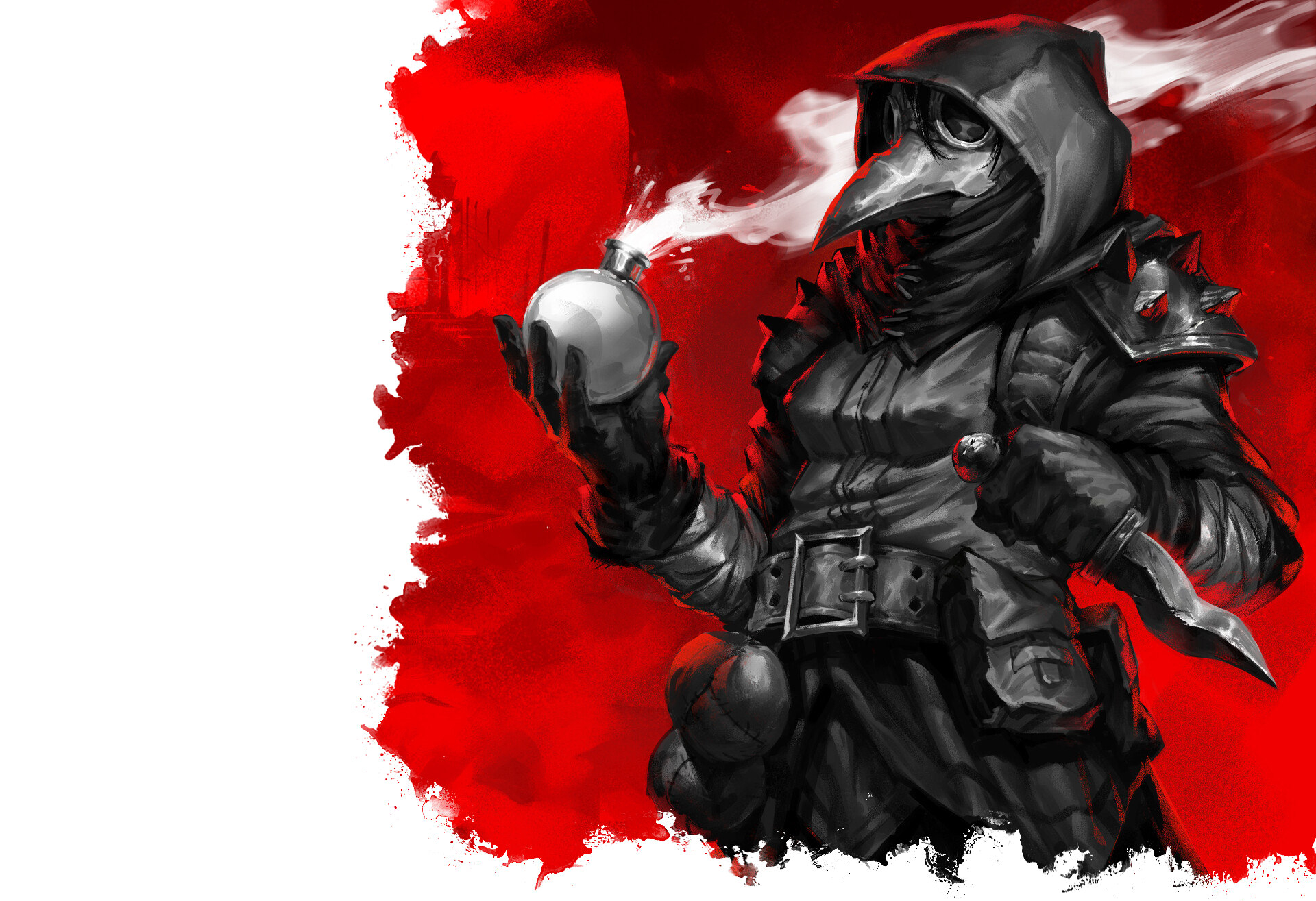
General Practices
The general practices are represented in alphabetical order.
Analgesic
While a healer's kit is on your person, as an action you can spend 1 practice point to grant 1d6 + your Intelligence modifier temporary hit points to a creature within 5 feet of you, plus your Intelligence modifier extra temporary hit points for each additional practice point you spend. These temporary hit points last 1 hour.
Beast's Evasion
Prerequisite: 7th level, Veterinarian Specialist
When your companion is subjected to an effect, such as a red dragon’s fiery breath or a lightning bolt spell, that allows it to make a Dexterity saving throw to take only half damage, it instead take no damage if it succeeds on a saving throw, and only half damage if it fails.
Bestial Rush
Prerequisite: Veterinarian Specialist
You can spend 1 practice point to have your beast companion take the Disengage or Dash action as a bonus action on its turn, and difficult terrain costs the beast no extra movement for that turn.
Careful Study
Prerequisite: 5th level, Psychiatrist Specialist
As an action, you can hone in on one creature you can see within 30 feet of you. For the next 10 minutes, you have advantage on Wisdom (Insight) checks against them to determine if they are telling the truth.
Once you use this feature, you cannot do so again until you finish a short or long rest.
Combat Medic
You gain proficiency in medium armour and shields.
Companion's Defence
Prerequisite: Veterinarian Specialist
You can spend 1 practice point to have your beast companion take the Dodge action as a bonus action on its turn.
Compassionate Care
Prerequisite: 9th level
When you would restore hit points to a creature, you can have that creature make a Wisdom saving throw against your Practice save DC. The creature has advantage on the saving throw if you or your companions are fighting it. If it fails the saving throw, it is charmed by you for 1 hour or until you or your companions do anything harmful to it. The charmed creature is friendly to you. The target is immune to this feature for 24 hours after succeeding on the saving throw or after the charm ends.
Converse with Beasts
Prerequisite: Veterinarian Specialist
You can understand beasts, as well as communicate with them through sounds and gestures.
Death's Tallyman
Prerequisite: Plague Doctor Specialist
Whenever a hostile creature is reduced to 0 hit points, you gain temporary hit points equal to your Intelligence modifier + one quarter your Physician level (rounded down, to a minimum of 1).
Barbiturates
Prerequisite: 7th level, Surgeon Specialist
While a healer's kit is on your person, as an action, you can spend 3 practice points to make up to 3 willing creatures of your choice within 15 feet of you fall unconscious for 10 minutes.
This feature ends on a target early if it takes damage or someone uses an action to shake or slap it awake. If a target remains unconscious for the full duration, that target gains the benefit of a short rest, and it can’t be affected by this feature again until it finishes a long rest.
Disciplined Mind
Prerequisite: 7th level
You gain proficiency in Wisdom saving throws.
Do No Harm
As a bonus action, you can spend 1 practice point to look the least threatening as possible and coax creatures into avoiding you in combat. For the next minute, any creature who targets you with an attack or a harmful spell must first make a Wisdom saving throw. On a failed save, the creature must choose a new target or lose the attack or spell. This feature doesn't protect you from area effects.
If you make an attack, force an enemy creature to make a saving throw, or deal damage to another creature, this feature ends.
Expansive Knowledge
You learn two additional skills of your choice.
Fleshfire Concoction
Prerequisite: 5th level, Plague Doctor Specialist
When you fashion a plague grenade, you can choose for it to deal necrotic damage instead of poison damage. Additionally, when you throw a plague grenade, you can spend 1 practice point to deal an additional 1d6 damage, plus an extra 1d6 damage for each additional practice point you spend.
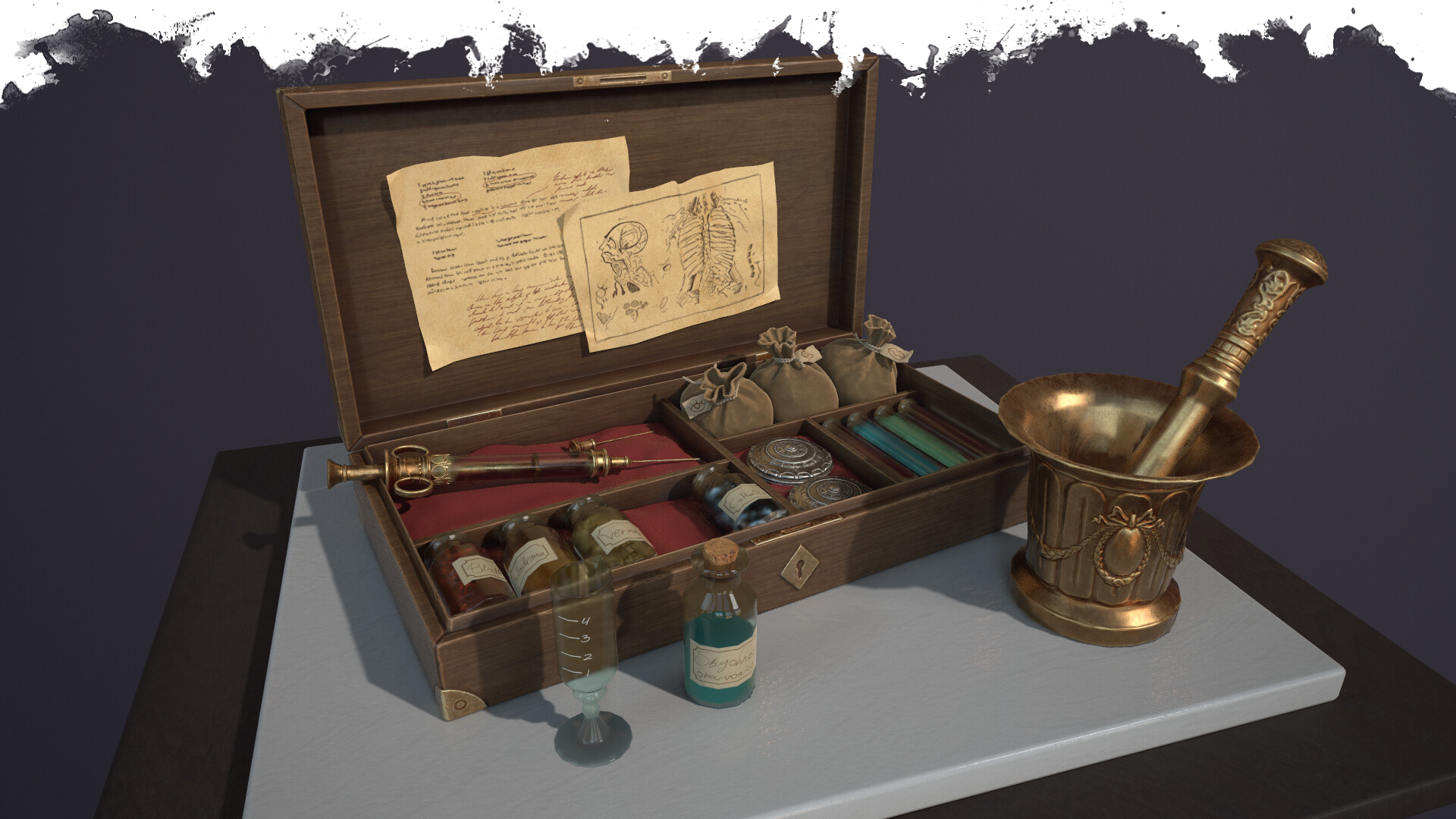
Frenzying Fumes
Prerequisite: Plague Doctor Specialist
While a herbalism kit is on your person, as an action, you choose one willing creature within 5 feet of you, granting it additional ferocity until the end of its next turn. On its next turn the creature must use its action to make a melee attack against a randomly determined creature within its reach. The first time the creature hits with an attack, it deals twice as much damage with the attack, and then the ferocity ends. You can't use this feature again until you finish a long rest.
Hemorrage
Prerequisite: Surgeon Specialist
When you hit a creature with a weapon attack, you can spend 1 practice point to deal an extra 1d4 necrotic damage and wound the creature. At the start of the wounded creature's turn, it takes 1d4 necrotic damage for each time you've wounded it, and then it makes a Constitution saving throw, ending the effects of all such wounds on itself on a success. Alternatively, the wounded creature, or a creature within 5 feet of it, can use an action to make a Wisdom (Medicine) check versus your Practice save DC, ending the effect of such wounds on a success.
Inflict Disease
Prerequisite: 12th level, Plague Doctor Specialist
While a herbalism kit is on your person, as an action, you can spend 5 practice points to make a melee attack against a creature within your reach. On hit the target is poisoned.
At the end of each of the target's turns, it makes a Constitution save. If the target succeeds on three of these saves, it is no longer poisoned, and the spell ends. If the target fails three of these saves, the target is no longer poisoned, but choose one of the diseases below. The target is subject to the chosen disease for 7 days.
Since this feature induces a natural disease in its target, any effect that removes a disease or otherwise ameliorates a disease’s effects apply to it.
Wasting Disease - The creature's muscles shrink. The creature has disadvantage on Strength Checks and Strength saving throws, can't take reactions, and deals only half damage with weapon attacks that use Strength.
Polio - The creature's joints lock up. The creature has disadvantage on Dexterity Checks and Dexterity saving throws and its speed is halved. During combat, at the start of a creature's turn, it must make a Constitution saving throw versus your Practice Save DC or be restrained until the start of its next turn.
Black Plague - On the creature's body black pustules form. The creature has disadvantage on Constitution Checks and Constitution Saving Throws. During combat, at the start of a creature's turn, it must make a Constitution saving throw versus your Practice Save DC or take 3d8 necrotic damage vomiting blood.
Spongiform Encephalopathy - The creature's mind becomes feverish. The creature has disadvantage on Intelligence Checks and Intelligence Saving Throws, automatically forgets anything that hasn't happened in the past 24 hours since becoming infected with the disease, can't use reactions, and can use either an action or a bonus action, not both. Regardless of the creature’s abilities or magic items, it can’t make more than one melee or ranged attack during its turn.
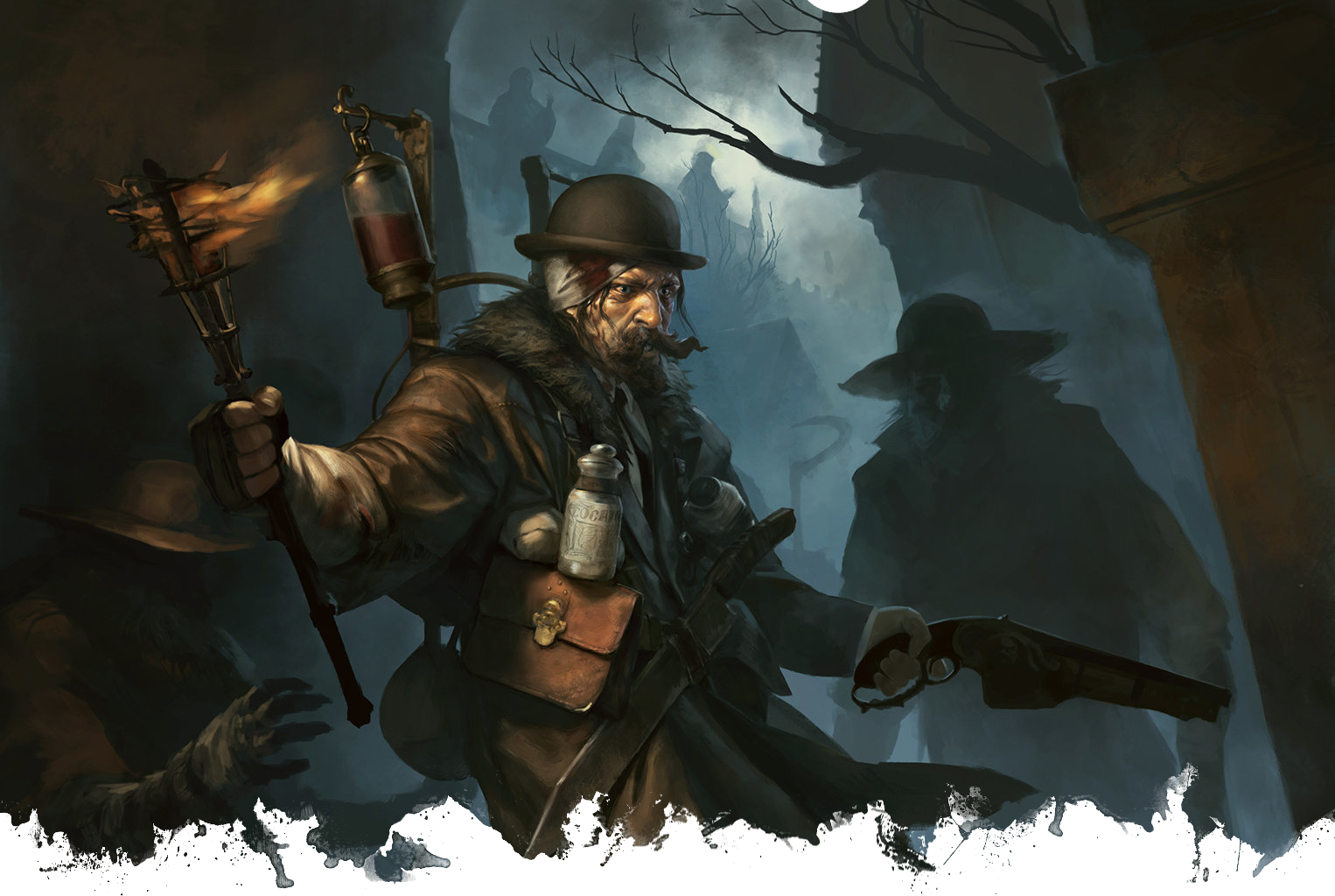
If the creature attempts to cast a spell with a casting time of 1 action, roll a d20. On an 11 or higher, the spell doesn’t take effect until the creature’s next turn, and the creature must use its action on that turn to complete the spell. If it can’t, the spell is wasted.
Rabies - The creature suffers from uncontrolled movement and starts frothing at the mouth. The creature has disadvantage on Wisdom Checks and Wisdom Saving Throws, and the creature behaves as if under the effects of the Confusion spell during Combat.
Smallpox - Fluid filled bumps cover the creature, eventually hemorrhaging. The creature has disadvatage on Charisma Checks and Charisma Saving Throws. whenever the creature takes damage, the creature takes an extra 1d8 necrotic damage, this damage ignores resistance and immunity.
Insinuating Cavalcade
Prerequisite: Psychiatrist Specialist
You can choose for your calculated strike feature to deal psychic damage instead of the same type dealt by the weapon.
Moment of Hysteria
Prerequisite: 15th level, Psychiatrist Specialist
As an action, you can summise a creature's being and speak a singular profound truth to them causing them to break down in realisation.
Choose one creature within 60 feet of you that can hear you and can understand a language you can speak. That creature must make a Wisdom saving throw versus your Practice save DC.
On a failed save roll a percentile dice and consult the Short-Term Madness table (see page 259 of the Dungeon Master's Guide), that creature suffers the effect that responds to the number rolled for 1 minute. A creature under the effects of this madness can repeat the saving throw at the end of each of their turns, ending the effect on a success.
If the saving throw is successful or the effect ends for it, the target is immune to this feature for the next 24 hours.
Noxious Wave
Prerequisite: 7th level, Plague Doctor Specialist
While a herbalism kit is on your person, as an action, you can spend 3 practice points to vent a wave of poisonous gas towards an area. Each creature in a 40 foot cone must make a Constitution saving throw.
On a failed save a creature takes 3d12 poison damage, plus an extra 1d12 damage for each additional practice points you spend and is poisoned until the end of your next turn. On a successful save a creature takes half as much damage and isn't poisoned.
Postmortem Care
Prerequisite: 5th level
As an action, you can spend 2 practice points and one use of a healer's kit on a corpse you can touch to protect it from suffering further stages of postmortem. For 8 hours the target is protected from decay. The feature also extends the time limit on raising the target from the dead from spells and features such as Resuscitation.
Quick Fix
You can use a healer's kit as a bonus action.
Reattachment Surgery
Prerequisite: 15th level, Surgeon Specialist
While a healer's kit is on your person, you can spend 1 hour and 7 practice points to knit a body member (finger, leg, tail and so on) that has been severed in the past 24 hours back to its stump. For the duration of the feature, the creature whos body part has been severed regains 1 hit point at the end of every minute.
Recommendation
Prerequisite: 5th level, Psychiatrist Specialist
As an action, you can suggest a course of activity (limited to a sentence or two) and influence a creature you can see within range that can hear and understand you. Creatures that can’t be charmed are immune to this effect. The suggestion must be worded in such a manner as to make the course of action sound reasonable. Asking the creature to stab itself, throw itself onto a spear, immolate itself, or do some other obviously harmful act ends this feature.
The target must make a Wisdom saving throw versus your Influence save DC. On a failed save, it purses the course of action you described to the best of its ability. The suggested course of action can continue for up to 8 hours. If the suggested activity can be completed in a shorter time, this feature ends when the subject finishes what it was asked to do.
You can also specify conditions that will trigger a special activity during the duration. For example, you might suggest that a knight give her warhorse to the first beggar she meets. If the condition isn’t met before this feature expires, the activity isn’t performed.
If you or any of your companions damage a creature affected by this feature, this feature ends for that creature. You cannot use this feature again until you finish a short or long rest.
Reconstructive Surgery
Prerequisite: 15th level, Surgeon Specialist
You can permanently change the appearance of a creature. You decide what they look like, including height, weight, facial features, the sound of their voice, hair length, colouration, and distinguishing characteristics, if any. You cannot make the creature appear as a member of another race. You cannot make the creature appear as a creature of a different size, and their basic shape stays the same, if they are bipedal, you cannot use this feature to make them quadrapedal, for instance. You must spend seven days and 5,000 gp worth of medical supplies to apply the changes to the creature.
Rehabilitation
Prerequisite: 12th level, Surgeon Specialist
You can spend 1 hour and 5 practice points on a creature you can touch to undo a debilitating effect. You can reduce the target's exhaustion level by one or end one of the following effects on the target.
- One condition. The condition can be blinded, deafened, incapacitated, paralyzed, stunned, or unconscious
- Any reduction to one of the target's ability scores
- One effect reducing the target's hit point maximum.
Routine Care
Prerequisite: 12th level
Whenever you make a Medicine, Insight, Animal Handling, or Nature check that lets you add your proficiency bonus, you can treat a d20 roll of 9 or lower as a 10.
Skill Refinement
Prerequisite: 12th level, Psychiatrist Specialist
As an action, you can advise one willing creature within 5 feet of you that can hear you to give it expertise in one skill or tool of your choice; for the next hour, the creature doubles its proficiency bonus for ability checks it makes that use the chosen skill or tool.
You must choose a skill or tool in which the target is proficient and that isn't already benefiting from an effect, such as Expertise, that doubles its proficiency bonus.
Once you use this feature, you cannot do so again until you finish a long rest.
Smelling Salts
While a healer's kit is in on your person, as a bonus action you can spend 1 practice point to restore 1d4 + your Intelligence modifier hit points to a creature you touch, plus an extra 1d4 hit points for each additional practice point you spend.
Starting Wealth by Class
| Class | Starting Gold |
|---|---|
| Physician | 5d4 x 10 gp |
Multiclassing Prerequisites
| Class | Ability Score Minimum |
|---|---|
| Physician | Intelligence 13 |
Multiclassing Proficiencies
| Class | Proficiencies Gained |
|---|---|
| Physician | Light Armour, Simple Weapons, Herbalism Kit |
Adventuring Gear
Equipment Packs
Doctor's Pack (48 gp) Includes a backpack, a book containing medical notes, a bottle of ink, an ink pen, healer's kit, herbalism kit, 2 sheets of parchment, 5 candles, a tinderbox, soap, and a waterskin.
Trade Goods
Trade Goods
| Cost | Goods |
|---|---|
| 300 gp | 1 lb. of medical supplies |
"Milo 'Rusty' Vanderbeck" by Jakub Dobi
"Healing" by Evgenia Kim
"Everrain - The Surgeon" by Bjorn Hurri
"Caller of the Untamed" from Magic the Gathering, drawn by Ian McCaig
"We All Have Issues" by Tina Bayne
"Plague Doctor" by BIGGIE
"Doctors Kit" by Magnus Evertsen
"Doctor" by Stepan Alekseev


